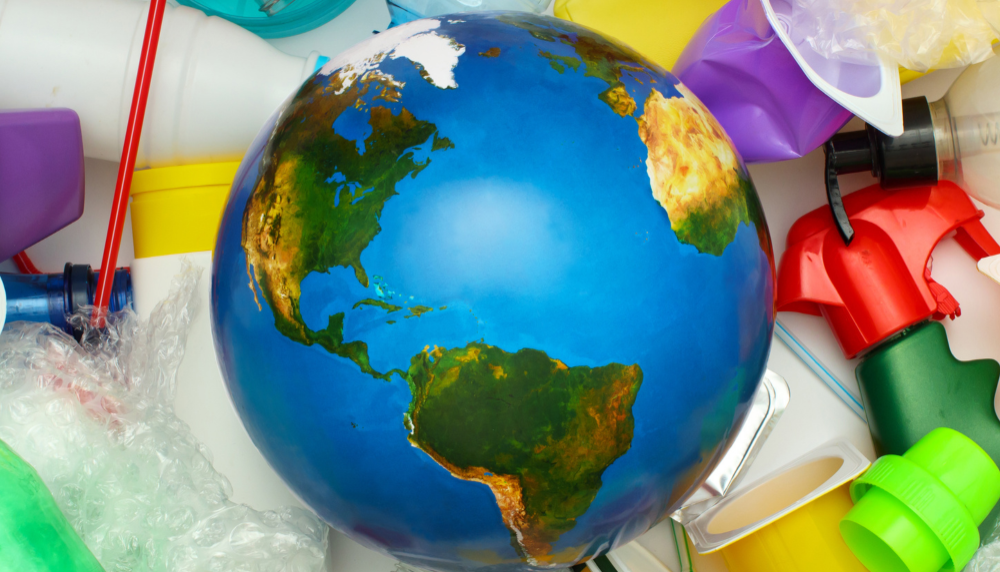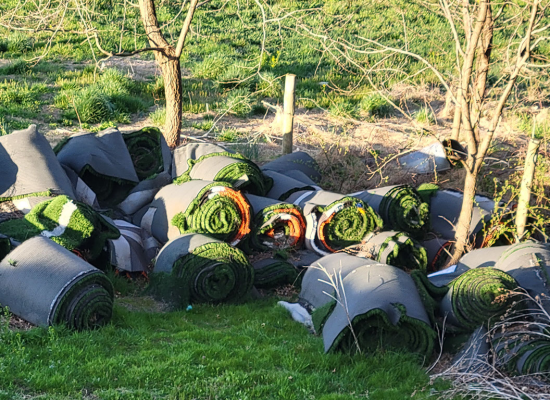Don’t Let Plastics Overtake the Earth
 Every day we learn more about how dangerous plastics are for human health and the environment. This Earth Day, we are recommitting ourselves to finding ways to rapidly reduce our dependence on plastics.
Every day we learn more about how dangerous plastics are for human health and the environment. This Earth Day, we are recommitting ourselves to finding ways to rapidly reduce our dependence on plastics.
Earth Day was first organized in 1970 to promote respect for life on of the planet and to encourage awareness about air, water, and soil pollution. Each year a different theme or topic is selected. This year’s theme is Invest in Our Planet.
Plastics is an apt topic for this Earth Day.
Investing in our planet will require all of us to divest from our over dependence on plastics. The growing use of plastics is locking us into a future of a rapidly changing climate and greater toxic pollution.
Plastics 101
We already know plastics are bad for the planet because they are often derived from fossil fuels and contain and leach hazardous chemicals that threaten human health, including per- and polyfluoroalkyl substances (PFAS). Fewer than 10% of plastics are recycled in the United States, which means that plastics often end up in landfills, or worse, our wildlands and oceans where they damage vulnerable ecosystems and threaten human health. To make matters worse, plastics do not readily degrade in the environment, instead breaking up into smaller and smaller pieces which are then dispersed by wind and water.
These dangers are well known, but plastics pose other less well-known threats.
One such threat is from pyrolysis, a process to turn plastics into fuel. The oil and gas industry is pushing this process to show that plastics can be part of the circular economy and used to create “green” fuels. But this process is extremely inefficient and produces incredible amounts of toxic pollution. For example, ProPublica recently reported on EPA’s approval of a request by Chevron to create fuel from discarded plastics. According to EPA’s own estimates, the emissions from that process are so toxic that 1 in 4 people exposed over a lifetime could get cancer. That risk is 250,000 times greater than the level usually considered acceptable by EPA.
PEER’s Work
The push to address plastics pollution is permeating many of PEER’s programs.
For example, PEER is pushing the government to lead by example in decreasing the demand and distribution of single-use plastics. Our current area of focus is the National Park Service (NPS). NPS has promised to reduce plastic use and phase out single-use plastics by 2032. But this is not soon enough. PEER, Beyond Plastics, and Green Latinos are pushing for NPS to phase out single-use plastics in two years, not ten, and to reduce plastic waste by 75 percent. There is no excuse to kick this can down the road to future administrations.
 PEER is also educating communities and municipalities across the country about the adverse health effects of artificial turf and supporting local efforts to use natural grass, not plastics, on playing fields. One reason is that the plastic in artificial turf contains PFAS and other dangerous chemicals which leach into our bodies and waterways. Children and athletes who play on these fields are at increased risk.
PEER is also educating communities and municipalities across the country about the adverse health effects of artificial turf and supporting local efforts to use natural grass, not plastics, on playing fields. One reason is that the plastic in artificial turf contains PFAS and other dangerous chemicals which leach into our bodies and waterways. Children and athletes who play on these fields are at increased risk.
Unfortunately, we know that EPA is dropping the ball on many important plastics issues. For example, we now know that PFAS, known as forever chemicals, are found in high quantities in many plastics. This disturbing discovery came about when PEER found PFAS in the pesticide Anvil 10-10. EPA subsequently determined that PFAS was leaching from the plastic barrels into the pesticides.
When EPA didn’t act to stop this toxic contamination, PEER partnered with the Center for Environmental Health (CEH) to sue Inhance Technologies, the company responsible for producing this PFAS. It turns out that the problem was much more pervasive. Inhance fluorinates hundreds of millions of plastic containers using a process that produces PFAS in violation of the Toxic Substances Control Act – putting workers, consumers, and communities across the United States at risk. Although EPA had known for over two years about these violations, the agency did nothing to stop this until PEER and CEH announced we would sue Inhance for violating the law.
Furthermore, PEER is advocating for head-to-toe reforms in EPA’s new chemicals program. This program has been captured by industry interests and is approving the use of chemicals with astronomical risks to the public, such as fuels derived from plastics. Under no circumstances should EPA be approving chemicals that create a 1 in 4 cancer risk for people living near the facility.
Finally, we are calling for greater transparency in the waste industry and petitioning EPA with the Environmental Justice Network and 300 other groups to require all incinerators and waste-to-energy facilities to report to the Toxic Release Inventory (TRI). The TRI requires certain industries to report their toxic releases to a publicly accessible database. Inexplicably, incinerators that burn plastics or create fuels from plastics are not required to report their toxic releases to the TRI.
A lot more needs to be done. In the coming year, PEER will continue its efforts to watchdog the government to make sure it does its part to reduce plastics pollution.
In honor of Earth Day, we invite you to make an investment in our planet by making a gift to PEER. We are committed to fighting to reduce our dependence on the use of plastics. Thank you for joining us in this effort.
 Colleen Teubner is a Litigation and Policy Attorney at PEER and a lover of backpacking, books, and board games.
Colleen Teubner is a Litigation and Policy Attorney at PEER and a lover of backpacking, books, and board games.
 Monica Mercola is PEER’s staff counsel.
Monica Mercola is PEER’s staff counsel.